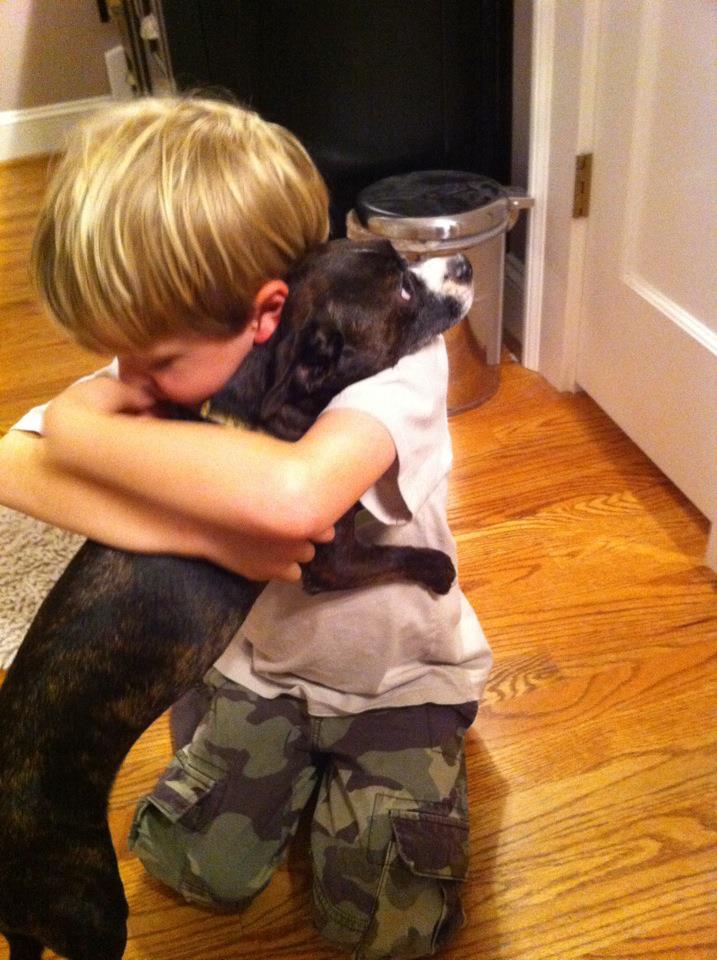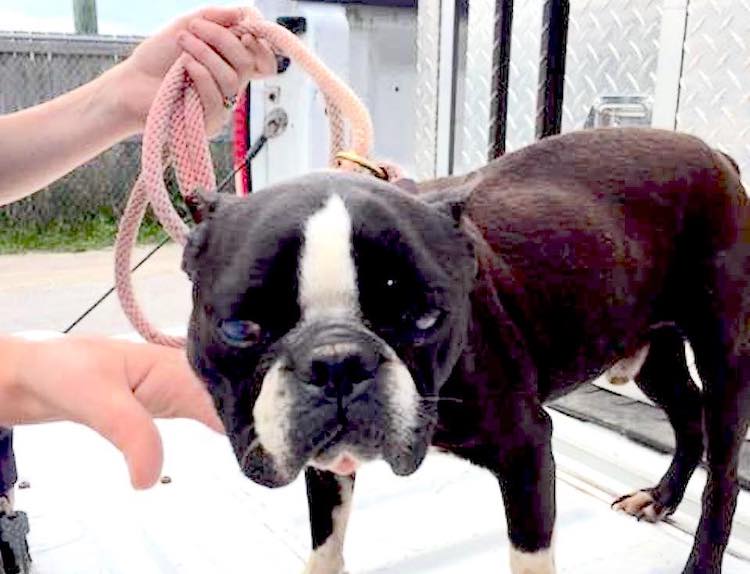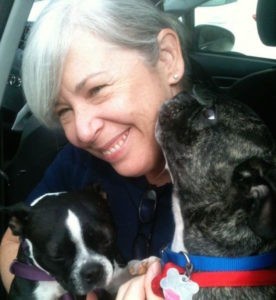Should you foster a rescued dog? Is fostering a dog right for you?
Good question! You should explore this question well in advance of bringing a foster dog into your home. I’m here to help.
I am not trying to talk you out of fostering. Quite the opposite! I WANT you to decide that fostering a dog is a good idea for you. I think fostering rescued dogs is incredibly rewarding. I believe fostering rescued dogs is important work.
I know we need more people to decide that fostering a dog is right for them.
I also want you to have a great experience going in.
Only You Can Decide If Fostering A Dog Is Right For You.
I cringe when I hear foster recruiters tell folks, “It’s easy. All you need to provide is love. We’ll handle the rest.”
They say, if you love dogs, then fostering dogs should be easy.
I don’t think fostering is that simple. 50 foster dogs later and I will tell you it is not that simple. It can be hard and messy and scary and emotional. It’s also challenging, rewarding, and incredibly meaningful.
How I Know Fostering A Dog Is Right For Me
I kept talking myself out of fostering dogs. I’d see a dog in need of help and I’d wait for someone else to volunteer. Then I fostered Lexi and experienced the joy of helping a little dog and a little boy form an inseparable bond. It was a pivotal moment in my life.

With each new dog I fostered, I experienced something new and different and equally meaningful. I became a better pet owner.
For me, the best thing about fostering dogs is helping them get better. Being there the moment they realize they are safe, warm, fed. The moment they connect with a human and the relationship begins to form. The moment they experience confidence after learning a new skill. The time they figure out what to do with toys. There’s no greater joy for me than to see a homeless dog develop into a good pet. The second joy is seeing them meet their new family on adoption day.
Is Fostering A Dog Right For You? Consider These Questions
- Do I have time?
- Am I teachable?
- Am I willing to see it through?
- Am I willing to problem-solve?
- Am I a team player? Even in conflict?
- Am I invested in the dog?
- Is my entire family on board with my play to foster? Are my pets OK with new dogs coming in to live?
Is It A Good Idea To Foster A Dog If I Don’t Have Time?
“I don’t think I’d be a good foster home because I work a full time job.”
When I first started fostering for an agency, I worked a full-time job and I was gone about 8 1/2 hours a day, M-F. The rescue agency and I decided which dogs would be the best match for my schedule. I fostered dogs that were healthy adults, already house-trained and crate-trained, and dogs that were already socialized.
When I arrived home from work, I spent an hour or so of free time providing the foster dog with exercise, socialization, and basic training. I fostered one dog at a time, never more than two.
If you work long hours, travel extensively, or have a full social calendar outside of work, fostering may not be right for you. You need to have some time to spend with your foster dog.
Even 30 minutes a day (every day) is enough.
You also need a little time for vet appointments, adoption events, and meet and greets. Some agencies have a great team to help fosters out, others are going to ask you to provide for your foster dog.
But really, fostering takes only a little extra time above what you already spend with your own dog. I can interact with my foster dog during
- meal time
- daily walks
- social visits with friends
- my house chores or yardwork
- riding in the car
- bedtime.
See? it isn’t a huge time commitment with the right foster dog.
What Skills Do I Need To Be A Good Foster Home For Dogs?
A Willingness to Learn
- “I don’t know anything about dog training.”
- ” I’ve never cared for a sick dog before.”
- “I don’t know how to __________.”
Experts don’t start fostering dogs. Fostering dogs develops you into an expert.
Are you teachable? You need to be teachable.
If you are willing to learn, willing to follow a protocol, willing to ask questions, willing to try new things, willing to communicate, willing to ask for help when you feel in over your head, fostering a dog is right for you.
Fostering dogs is hard when you are isolated. Fostering for a rescue agency is hard when you are quiet.
Fostering a dog is easier when you have a mentor and a network that includes dog professionals – veterinarians, kind trainers, and yep… even a reputable breeder.
If you decide that you want to give fostering a try, choose an agency with a proven track record for mentoring foster homes.
A Willingness to Commit
“Will I get stuck with a dog I don’t want?
You shouldn’t, if you’ve chosen a reputable rescue. That said, it may take an agency more than a few minutes to arrange all of the pieces and parts required to move a homeless dog from your home to a new, safe location.
Can you stick it out? See it through? Problem solve?
Fostering isn’t a forever gig. You can stop anytime you want to.
Having said that, when you agree to bring home an agency’s foster dog, you’ve entered into an agreement to do your best. You commit to seeing it through.
- See it through until the agency can move the foster dog if it’s not the right fit.
- See it through until the foster dog is adopted.
- See it through even when the foster dog keeps needing trips to the vet.
- See it through when you were told a foster dog is house-trained and it isn’t.
- See it through even when it seems hard or you feel frustrated.
- No one says you have to keep a foster dog in your home that’s unsafe. You do not have to do that, and your rescue agency should quickly respond to you if your situation is unsafe.
Do accept the idea that fostering at times will be inconvenient. Messy. Loud. You’ll lose sleep. There will be pee. You’ll lose your favorite pair of shoes. One of your decorative pillows might get de-stuffed. All of those things may be enough for you to say, “Fostering isn’t for me.” That’s OK. Really, it is.
Just see it through until your foster dog has a new place to go. Be professional, participate in the problem solving, and be patient.
Be a team player. Be professional. Represent your agency.
You are an agent of the agency for whom you’ve agreed to volunteer. You’ve entered into an agreement to provide a service for an agency. Commit to that agreement. Represent your agency with professionalism.
You have already done your homework and selected an agency that’s the right fit for you. Honor your selection by following policy, procedure, rules, methods, protocols, schedules, and meeting your obligations.
Don’t agree with one of their practices? Leave it at the door or choose a different agency. I certainly have my standards and there are a few agencies I’d never foster for because of the difference in beliefs. No rescue agency is perfect; no rescue agency is going to match all of your criteria.
If you decide you’ve made a choice that you shouldn’t have, find the most appropriate, professional exit once your foster dog is moved or placed.
Commit To The Foster Dog
This homeless dog didn’t ask to be homeless. It didn’t as to be neglected, poorly socialized, mistreated, sick and scared.
Tell your foster dog you will, to the best of your ability, make each day better than the day before.
- Commit to restoring their health, the best you can.
- Commit to easing their fears, best you can.
- Commit to teaching them a new skill, best you can.
- Commit to building their confidence, best you can.
- Commit to learning everything you can to help this dog become a better pet.
And if it turns out this foster dog isn’t right for your situation or you’ve had a change of heart, commit to participating in a reasonable plan to get the dog moved.
Commit To Yourself, Your Family and Your Pets
When fostering for a rescue agency, your priority is to you, your family, and your personal pets.
Fostering a dog may feel right for you, but is it also right for your family and your personal pets?
Be absolutely sure that everyone in your family is in agreement before you bring a foster dog home. Because I promise you, every one in the home is affected, and every one is involved in the process. Even your pets.
Listen to your family, check in with them. Do they still agree that fostering a dog is a good idea?
If your family is tired of fostering, find a stopping point. If your dog or cat or pig or pet chicken is demonstrating stress behaviors of any kind that you can attribute to your foster dogs, stop fostering. Or hire a trainer who uses kind, science-based methods to help you sort out the source of the stress and help you develop a management or training plan.
Take care of your personal pets. Protect them. Listen to them. Give them breaks.
I give Otis breaks after most foster dogs move on. Sometimes it is a few days, other times, it’s a few months. I also give Otis perks that the foster dogs do not get. For example, Otis sleeps in the bed with me, my foster dogs do not. Otis gets alone time. He gets his own training time. He even has a certain set of toys that only he gets to play with. The other toys are shared.
A fellow rescuer ruined her dog – a really good, well-balanced dog – because she failed to learn the basics of proper introductions, and she failed to manage social situations where her good dog was subjected to repeated obnoxious behavior from her foster dogs. Her dog eventually developed reactivity issues and she had to stop fostering. It was really sad, and totally unavoidable.
Your family members all adjust and shift when you bring home a foster dog. Your pets adjust and work when they have to meet and live with a new dog. While your pets can benefit and learn new skills, it is still work, it’s still stressful, and your family members – your furry ones too – need the opportunity to have a break. At some point, they will require a break.
You may need a break. Everyone who fosters should have a mentor or a coach or support person who can look at you and say, “Hey. What are you doing to care for yourself?”
Commit to keeping your family and personal pets healthy while you are fostering. Make sure your pets don’t catch illnesses or conditions your foster dog may bring home. Learn how to quarantine. Don’t be afraid to set some parameters on what vetting needs to be complete before a dog comes to your home. While most contageous conditons can be safely managed in a foster home environment, be informed. If a family member suffers from an immuno-compromised condition or you have elderly dogs, you’ll want to avoid surprises. Ask questions, ask questions, ask questions.
Consider If Niche Fostering Is Right For You
I’m a huge advocate of niche fostering.
Niche fostering means you decide to specialize in fostering a particular dog – particular age, particular time frame, particular illness or condition. It means you decide to become an expert in one particular area of fostering.
you can:
- foster pregnant females and help whelp newborn puppies, raising the litter.
- foster older puppies for socialization
- foster senior dogs
- foster hospice dogs
- foster dogs undergoing heartworm treatment
- foster fearful dogs
- short-term foster
- foster dogs with anxieties or phobias
- foster dogs with particular medical conditions, such as epilepsy or cleft palate, as examples
- be a respite foster while other fosters need to be out of town
- foster for a breed-specific rescue
I like niche fostering because I can have flexibility with which agencies I foster, and I like niche fostering because I can really hone my skills. My favorite niches are heartworm treatment and working with fear issues in dogs. I’m also really interested in working with pregnant dogs and raising their litters, but I have not done that yet!
Niche fostering requires you to commit to seeking out the best education and science available and applying what you learn.
Fostering A Dog Isn’t Right for Everyone
You may decide that fostering isn’t for you, or that the time isn’t right for your family at the moment. It is OK! Personally, I think it’s a responsible decision.
You may have first thought that fostering is right for you and then determined it wasn’t a good idea to foster a dog. That’s OK, too!! I appreciate you giving it a go.
If you still want to help, there are so many ways an agency can use your help! Talk with the agency admins about other ways you can volunteer. You are needed!
How else do you determine is fostering a dog right for you? If you find you are committed to best practices, I say try it. The worst that can happen is that you get attached and can’t let your foster dog go!
I hope that in reading this post, you’ve been challenged to consider fostering homeless dogs when the time is right. It is good work. It is rewarding, challenging, and full of self-discovery. Despite your needs being fulfilled, you’ve changed a dog’s life for the better, made them a better pet, connected that dog to the family that’s right for it, and kept a community safe in the process. No better role in the world, if you ask me.

Popular Posts
- HOW TO CHOOSE A DOG RESCUE AGENCY
- ULTIMATE GUIDE TO FOSTERING: 10 SKILLS YOU NEED
- VOLUNTEER IF YOU CANNOT FOSTER





